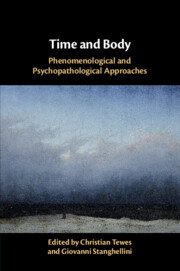Book contents
- Time and Body
- Endorsements for Time and Body
- Time and Body
- Copyright page
- Dedication
- Additional material
- Contents
- Figures
- Contributors
- 1 Introduction – Time and Body
- 2 Time, the Body, and the Other in Phenomenology and Psychopathology
- Part I Body and Time: General Aspects
- Part II Grief and Anxiety
- Part III Borderline Personality and Eating Disorders
- 9 Emotion Regulation in a Disordered World
- 9.1 Commentary on “Emotion Regulation in a Disordered World: Understanding Borderline Personality Disorder”
- 10 Nobody? Disturbed Self-Experience in Borderline Personality Disorder and Four Kinds of Instabilities
- 10.1 Commentary on “Nobody? Disturbed Self-Experience in Borderline Personality Disorder and Four Kinds of Instabilities”
- 11 Levels of Embodiment
- 11.1 Commentary on “Levels of Embodiment: A Husserlian Analysis of Gender and the Development of Eating Disorders”
- 12 Phenomenology of Corporeality (and Spatiality) in Anorexia Nervosa with a Reference to the Problem of Its Temporality
- 12.1 Commentary on “Phenomenology of Corporeality (and Spatiality) in Anorexia Nervosa with a Reference to the Problem of Its Temporality”
- Part IV Depression, Schizophrenia, and Dementia
- Index
- References
11 - Levels of Embodiment
A Husserlian Analysis of Gender and the Development of Eating Disorders
from Part III - Borderline Personality and Eating Disorders
Published online by Cambridge University Press: 30 October 2020
- Time and Body
- Endorsements for Time and Body
- Time and Body
- Copyright page
- Dedication
- Additional material
- Contents
- Figures
- Contributors
- 1 Introduction – Time and Body
- 2 Time, the Body, and the Other in Phenomenology and Psychopathology
- Part I Body and Time: General Aspects
- Part II Grief and Anxiety
- Part III Borderline Personality and Eating Disorders
- 9 Emotion Regulation in a Disordered World
- 9.1 Commentary on “Emotion Regulation in a Disordered World: Understanding Borderline Personality Disorder”
- 10 Nobody? Disturbed Self-Experience in Borderline Personality Disorder and Four Kinds of Instabilities
- 10.1 Commentary on “Nobody? Disturbed Self-Experience in Borderline Personality Disorder and Four Kinds of Instabilities”
- 11 Levels of Embodiment
- 11.1 Commentary on “Levels of Embodiment: A Husserlian Analysis of Gender and the Development of Eating Disorders”
- 12 Phenomenology of Corporeality (and Spatiality) in Anorexia Nervosa with a Reference to the Problem of Its Temporality
- 12.1 Commentary on “Phenomenology of Corporeality (and Spatiality) in Anorexia Nervosa with a Reference to the Problem of Its Temporality”
- Part IV Depression, Schizophrenia, and Dementia
- Index
- References
Summary
This chapter makes the argument that there are several levels of the constitution of experience indicated in Husserl's phenomenology, and that they are much more systematically in place in his work than might first appear. These levels begin from the ‘lowest’, hyletic level of raw sensory experience, move up through passive synthesis and the active constitution of objects, and then reach two final levels of intersubjectivity. After providing an overview of each of these levels, the chapter turns to an application of this understanding of phenomenological constitution to the experience of gender, and more specifically, to eating disorders. In doing so, it demonstrates that these levels of constitution can be applied to areas beyond phenomenology, and hopefully, that they can provide structures and terminology that assist in the explanation of many differing approaches to experience.
- Type
- Chapter
- Information
- Time and BodyPhenomenological and Psychopathological Approaches, pp. 234 - 255Publisher: Cambridge University PressPrint publication year: 2020

